Nowhere to run: The international law ripping children from their mothers
Content warning: This story contains graphic depictions of domestic violence. This story was produced in partnership with Type Investigations.
Their first kiss was in the laundry room of a hostel.
It was 2010, and Jewel Lazaro was road-tripping through British Columbia before starting community college in her hometown, Seattle. She was assigned several roommates at a Vancouver hostel, one of them an intriguing Irishman.
Seth Colchester was dark haired and blue eyed, and seemed to know a little about everything. He’d grown up surrounded by sheep and cows on an organic farm, but was working as a deejay in Spain, he told Jewel. After a night of dancing and flirting, they found privacy amid the hum of the washing machines.
They dated long distance. In 2013, when she was 23, Jewel moved to Dubai to work as a flight attendant for Emirates. It was exciting to crisscross the globe every week, but before long she was exhausted.
Seth told her to quit, she said. She could move into his loft in Barcelona and pursue her passions — singing, songwriting, art.
“I loved him, and I trusted him,” she said. “I was really naive.”
In close quarters, Jewel said she saw a new side of her boyfriend. “He would constantly belittle me and make me feel stupid,” she said. “He would say things he knew would make me upset, then get mad at me for being emotional.”
He told her birth control pills were unhealthy, and she should stop taking them, she said. She did. In spring 2014, she found out she was pregnant.
That’s also when Seth first became violent, she later said in court papers. Angry that she wouldn’t accompany him to a party one night, he hurled a ceramic bowl filled with hot soup at her head, she said. In her second trimester, when she asked him to slow down on a drive in the country, he allegedly hit her, dragged her out of the car and to the ground, and sped off, leaving her in a field for hours. Afterward, she emailed a domestic violence crisis center, which urged her to call its hotline or the police. But Seth apologized and said it wouldn’t happen again, she said.
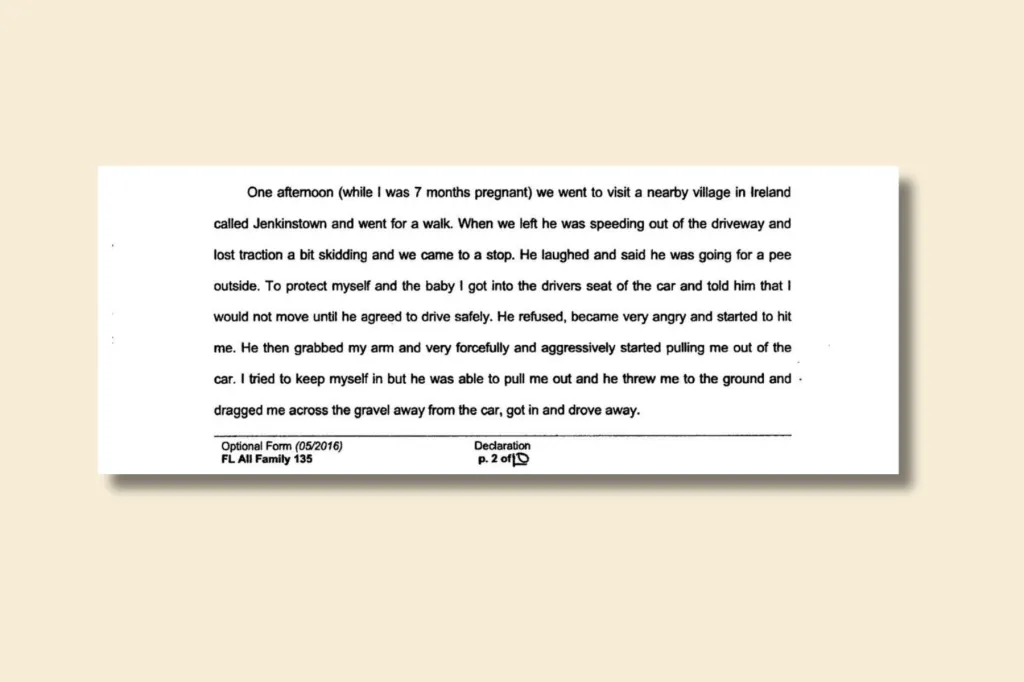 After fleeing Spain with her daughter in 2018, Jewel alleged in a sworn court declaration that her ex-partner, Seth Colchester, had abused her. (The 19th/TYPE)
After fleeing Spain with her daughter in 2018, Jewel alleged in a sworn court declaration that her ex-partner, Seth Colchester, had abused her. (The 19th/TYPE)Their daughter was born in early 2015. For privacy, she is identified only by her middle name, Lucia.
Seth grew even more volatile after Lucia’s arrival, according to Jewel’s court papers. One day, he allegedly ripped the child from Jewel’s breast, hoisted her above his head, and ran around the house with her as Jewel begged him to give her back.
In the same court papers, Jewel alleged that Seth was a drug dealer. He’d shown her a warehouse where he was growing a vast crop of cannabis under special lights, she said. There had been garbage bags full of marijuana in the basement of a home he rented in the countryside, she said, and stacks of cash buried in plastic in the yard.
By the time Lucia was six months old, the warehouse had burned down, the basement had been burglarized, and the dog had dug up the money, according to Jewel. She later said she asked Seth to find a safer line of work, but he didn’t. In spring 2016, she left him.
He paid for her and Lucia’s new apartment, and she said he routinely let himself in and yelled at her. One day, when she was out, he smashed her guitar. In winter 2018, he told her she couldn’t live there anymore.
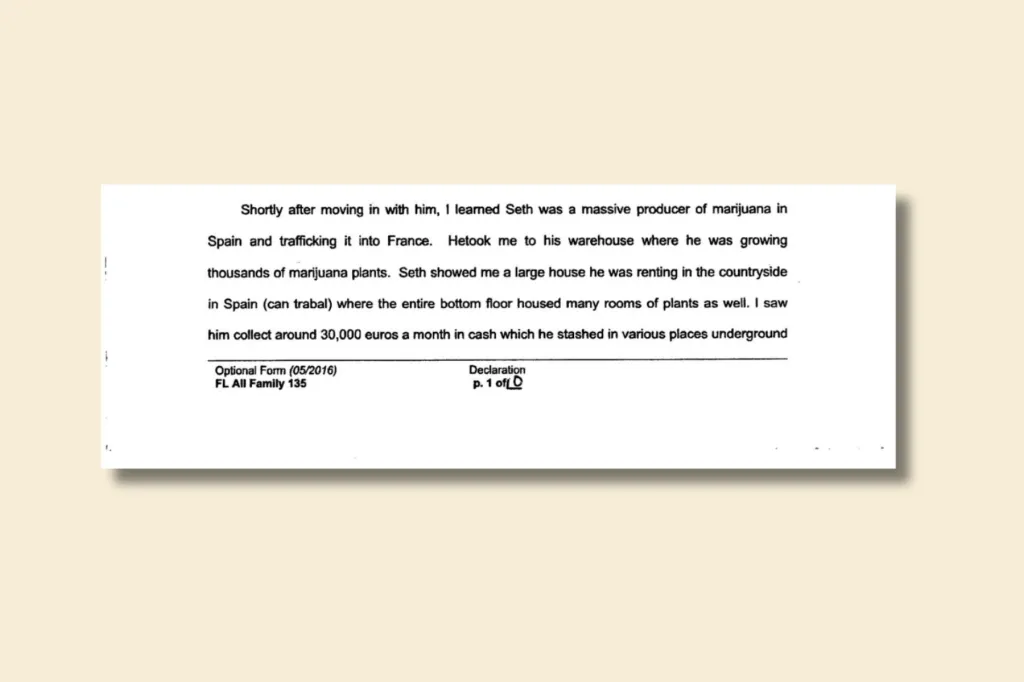 In the sworn declaration she filed in court after fleeing Spain in 2018, Jewel accused Seth of growing and trafficking large amounts of marijuana. (The 19th/TYPE)
In the sworn declaration she filed in court after fleeing Spain in 2018, Jewel accused Seth of growing and trafficking large amounts of marijuana. (The 19th/TYPE)Shortly after, Jewel made a startling discovery. Arriving to pick up Lucia from her private, progressive preschool, Jewel saw her lying on her back with her leggings down as two older boys touched her between the legs. A teacher looked on from a few feet away.
Jewel demanded a meeting with school officials, which she recorded and got Seth to attend. Sexual “play” among the children, supervised by adults, was a normal, permissible activity at the school — a game like any other, the officials said.
Jewel was horrified, but Seth said he trusted the school.
“This was the first time I got up the strength to flee my abuser,” Jewel wrote in court papers.
In April, without warning Seth, she took Lucia across the Atlantic Ocean, to her mother’s home in Sultan, Washington. Immediately, she hired a lawyer, who helped her file for custody in Snohomish County Superior Court. In a sworn statement, she portrayed Seth as an abusive criminal who couldn’t safely raise their child.
Seth declined a request for an interview, saying he wanted to protect his daughter’s privacy, and he didn’t respond to a list of detailed questions. But in Snohomish County court papers, he “unequivocally” denied Jewel’s allegations and sought to dismiss the custody suit. In the same court, he filed a petition summoning Lucia back to Spain. He cited a treaty Jewel hadn’t heard of: the Hague Convention on the Civil Aspects of International Child Abduction.
The pact was brokered by mostly Western diplomats in 1980, when divorce rates were soaring. There was a consensus, supported by limited data, that fathers who had lost custody of their children were kidnapping them and hiding them abroad, leaving mothers with no means of redress. In the United States, the media told heartbreaking stories of American children who’d vanished into the Middle East with their violent immigrant fathers.
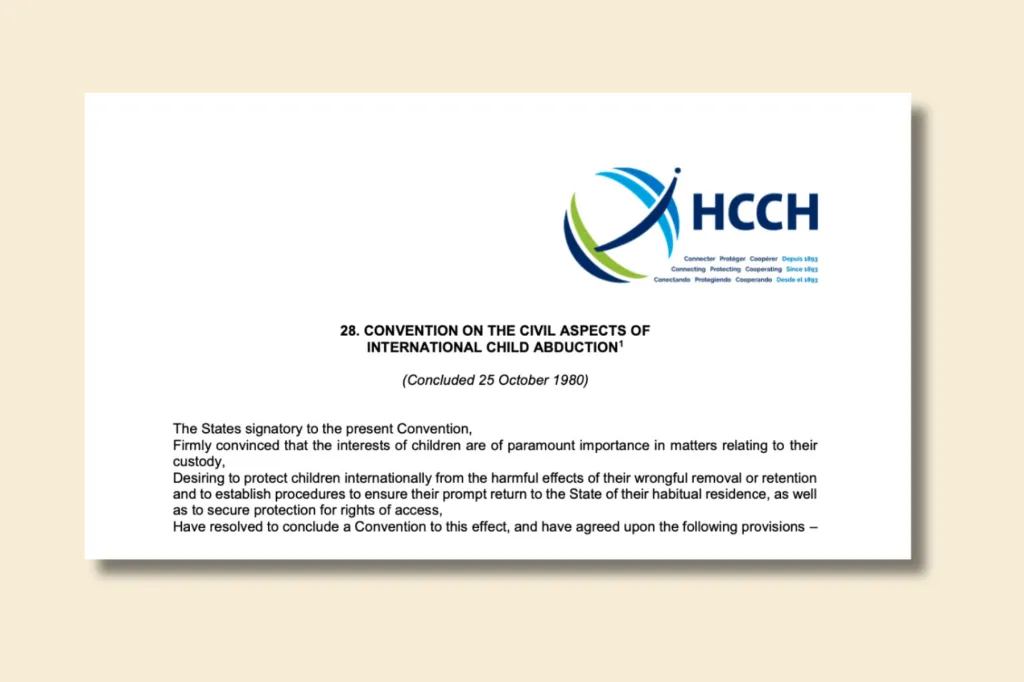 The Hague Abduction Convention was brokered by mostly Western diplomats. There are now more than 100 member states in North America, Europe, South America, Asia and the Pacific, and Africa. (The 19th/TYPE)
The Hague Abduction Convention was brokered by mostly Western diplomats. There are now more than 100 member states in North America, Europe, South America, Asia and the Pacific, and Africa. (The 19th/TYPE)Congress implemented the treaty in 1988 with the passage of the International Child Abduction Remedies Act, or ICARA, and the State Department pressed other nations to follow. Countries in the convention — today, there are more than 100 — must return one another’s children when a parent asks, subject to various exceptions. In 2021, the last year for which numbers are available, more than 2,190 return petitions were filed around the world, including more than 300 seeking the return of children who, like Lucia, were brought to the United States from abroad.
But contrary to what the drafters anticipated, only a minority of petitions are filed by mothers, according to data from the Hague Conference on Private International Law, which administers the treaty. In 2021, fathers filed about 73 percent of cases in the United States and about 75 percent worldwide.
Often, their wives and children had good reason to run, The 19th and Type found in a 16-month investigation.
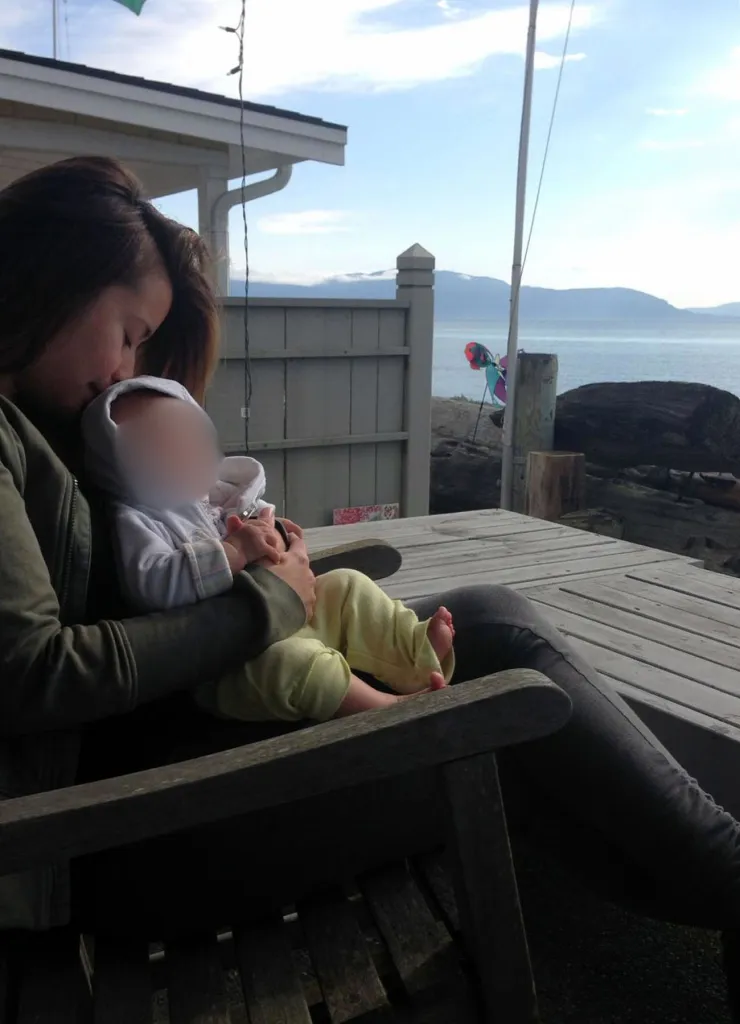 Jewel is pictured with her daughter, Lucia, during a visit with family in Washington state in 2015. (Courtesy of the Lazaro family)
Jewel is pictured with her daughter, Lucia, during a visit with family in Washington state in 2015. (Courtesy of the Lazaro family)We interviewed Jewel and 25 other “Hague mothers,” most of them Americans who fled Europe and Latin America. We also analyzed all the rulings published in U.S. Hague cases from July 1, 2022, to June 30, 2024. In each case, a parent who lived overseas was petitioning for the return of at least one child brought to the United States.
This analysis suggests that, in many ways, Jewel’s situation is typical. Out of 114 published cases, 77 percent were filed by fathers against mothers, at least 79 percent of whom accused the petitioning father of spousal abuse, child abuse or both. We did not attempt to independently verify the abuse claims, but scholars have found that neither children nor mothers are likely to fabricate abuse claims during custody disputes.
Responding mothers, 44 percent of whom were American, commonly said in court papers that their exes had raped, strangled or threatened to kill them abroad, often in front of the children. Mothers also accused fathers of biting them, hitting them, shoving them into walls and to the ground, stealing from them, demeaning them, stalking them, hacking into their email, and blocking their access to money, transportation and friends. Some mothers accused fathers of molesting or beating the children. One petitioning father had been convicted in Israel of whipping his daughter with a belt; another was incarcerated in Scotland for killing his mother.
By design, however, both the treaty and ICARA favor petitioners. The exceptions to return are narrow, the burden of proof is on the respondent, and the resolution is supposed to be swift.
Often, mothers who claim abuse cite the treaty’s “grave risk” exception, which allows judges to deny a petition if return could expose the children to physical or psychological harm or an otherwise “intolerable situation.” But in our study sample, judges rarely accepted the grave risk defense, even when it was supported by evidence such as text messages, photographs, medical records, domestic violence restraining orders and police reports. Overall, fathers accused of abuse stood a 55 percent chance of winning their children’s return, either through an order or a settlement, compared to 58 percent of petitioners in general.
Many mothers who lose Hague cases in the United States fight for custody overseas, but, cast as kidnappers, they often lose, experts say. Some mothers we interviewed are allowed only weekends and holidays with their children, while others have been banished from their lives. A few have faced criminal kidnapping charges.
Typically, Hague mothers are left broke, frightened and desperate. Many have been begging for help for years, to no avail.
“There are so many men’s rights groups and men’s activist groups, and they have so much money and so much support, and we have no money, just a whole heap of mothers reaching through their screens and holding hands together in solidarity,” said an Australian mother whose anonymous Instagram, Her Hague Story, is devoted to women and children affected by the treaty. “Once you’re Hagued, it’s just all about survival.”
Seeking sanctuary
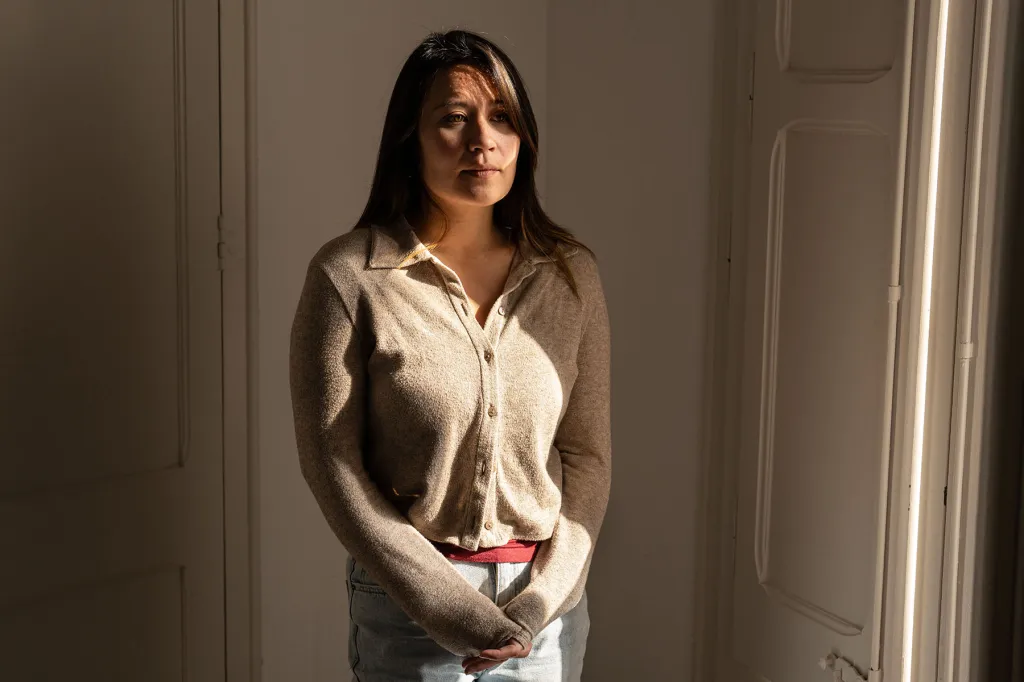 Jewel, now 35, has been fighting for custody of her daughter since 2018. (ROBIN HAMMOND FOR THE 19TH)
Jewel, now 35, has been fighting for custody of her daughter since 2018. (ROBIN HAMMOND FOR THE 19TH)The sky was gray over Snohomish County on August 31, 2018, and Jewel had a bad feeling as she approached the courthouse. That day, at a hearing, a judge would decide if Lucia, an American citizen, could stay in the United States.
To beat a Hague petition, respondents must generally establish one of five defenses, most of which didn’t apply in Jewel’s case. Her best bet was the grave risk defense, even though, under ICARA, it has to be proven by the high standard of “clear and convincing” evidence. By contrast, petitioners are held to the lower “preponderance of the evidence” standard in showing that their children were “wrongfully removed” from their home country.
In our analysis of recent cases, most responding mothers who alleged abuse attempted to prove the grave risk defense, but only 17 percent succeeded. In many cases, judges said the exception didn’t apply because the alleged abuse mainly targeted the mother, whose safety isn’t addressed in the treaty. Some judges questioned the mother’s credibility, said she failed to adequately corroborate her claims or deemed them insufficiently dire.
It’s essential that fleeing mothers retain an attorney who understands the niche field of Hague law, said Nicole Fidler, an attorney at Sanctuary for Families, a New York nonprofit that serves domestic violence victims. But while the State Department helps petitioners find knowledgeable, affordable counsel through its Hague Convention Attorney Network, it leaves respondents, including Americans like Jewel, in the cold. This leads to an “inequality of arms” in the courtroom, Fidler said, which is heightened in the many cases where financial abuse has left mothers impoverished.
“There is such an imbalance of power,” she said.
Jewel found her lawyer, Kathryn Peterson, online, and she couldn’t pay her much. Though Peterson filed a detailed brief supporting Jewel’s custody bid, it didn’t develop a defense to Seth’s Hague petition, which went unanswered, court records show. Under the treaty, custody cases can’t be decided when an application for return is pending, since it’s not clear which country will have jurisdiction.
In an email, Peterson said she was only hired for the custody suit; in the Hague case, she said, Jewel was unrepresented. Jewel said she had no inkling of this until two days before the hearing on both cases, when Peterson urged her to “find someone who was in international law.”
In a ruling from the bench that was neither tape recorded nor transcribed, Judge Janice Ellis ordered Lucia, who was 3 1/2, back to Spain in Seth’s care. Ellis dismissed Jewel’s custody bid for lack of jurisdiction.
Seth picked Lucia up later that day, in the parking lot of a bakery in Sultan.
“It was like a bomb went off in my body,” Jewel said. She spent the next several hours in a “zombie-like state,” calling lawyers in a fruitless search for hope. Then she got sick. For weeks, it seemed she had the flu; later, she was struck with night terrors, heart palpitations, breathing problems, and a sense of physical numbness.
On transatlantic video calls, Lucia seemed broken, too, according to Jewel.
“Mommy, I need you!” the child cried one day.
“I know, baby. I need you, too.”
It was like a bomb went off in my body."
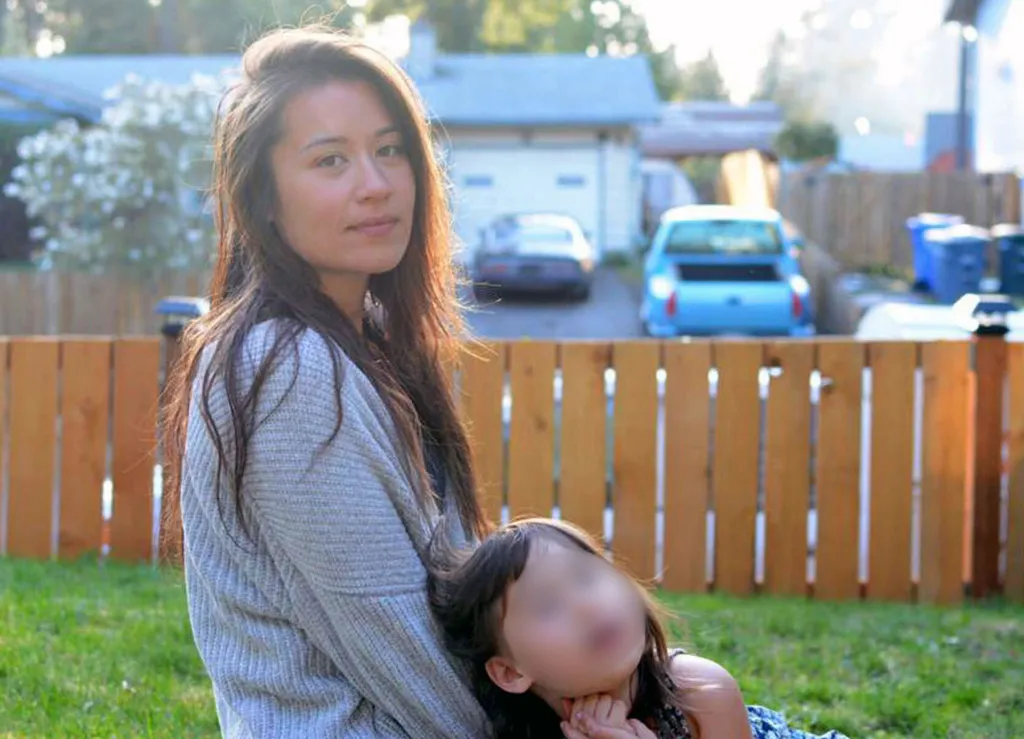 After Lucia was ordered back to Spain in 2018, Jewel’s access to her was limited. Mother and daughter are pictured here in Puyallup, Washington, in 2020. (Courtesy of the Lazaro family)
After Lucia was ordered back to Spain in 2018, Jewel’s access to her was limited. Mother and daughter are pictured here in Puyallup, Washington, in 2020. (Courtesy of the Lazaro family)Meanwhile, unbeknownst to Jewel, Spanish police were investigating Seth as the main suspect in a “criminal organization” dedicated to illegal marijuana production and trafficking in the provinces of Barcelona and Girona, Spanish court records show. In fall 2018, while the investigation was underway, he and Lucia left Spain for Vancouver, Canada. Later, he testified that Lucia had been suffering without Jewel, and he wanted them to spend weekends together.
That didn’t work out. Jewel said that whenever one of her visits with Lucia ended, the girl would scream, cry, and kick, sometimes refusing to get in Seth’s car. He said she was regressing and blamed Jewel. In early 2019, he took Lucia back to Spain, where he opened a kombucha shop. By this time, a judge had shut down the drug investigation, saying the police’s evidence against Seth was weak.
In another Spanish court, Seth filed for sole custody of Lucia; so did Jewel, who also sought permission to relocate her to Washington. She didn’t reprise her abuse allegations because her Spanish lawyer advised her not to, she said, though she never fully understood why.
Citing Seth’s local business, Jewel’s distant location, and Lucia’s need for stability, the judge granted Seth sole custody and ordered Jewel to pay him child support, even though, due to poor health, she wasn’t working. Her visits would be limited to one week every month and had to occur in Barcelona, though those restrictions would be lifted during school breaks.
“I felt like I wanted to die,” Jewel said. Some days, she felt so sick that she thought she might.
She was arranging for Lucia to spend her Easter break in Washington when the pandemic struck. If she insisted on an Easter visit, Seth said, she’d have to come to his country house.
She arrived in Spain at the end of March to whoops of joy from Lucia, who had recently turned 5. But Seth spent the next week terrorizing them both, Jewel said.
“[Lucia] would sneak into my room after he went to bed, but every morning, he would get angry about it,” she said. One morning, “he started chasing her, screaming at her, and shaking his finger in her face as she cried.” He walked away, then “came back with a tool, aggressively removed the door handle, and said, ‘You won’t be able to keep her in here.’”
Later in the visit, when Jewel heard Seth yelling at Lucia, she pressed record on her phone. “Get down the stairs before I kick you down the stairs!” he said. “I hate you!” Lucia replied.
According to Jewel’s court testimony, Seth fulfilled his threat to kick the child, who stumbled down a couple of stairs. He denied this and said the recording took his words out of context.
Jewel had her lawyer call the police, who met her a short distance from the house. But her Spanish wasn’t great, and she struggled to explain what was wrong, she said. Still, she said, the police suggested she leave, and Seth watched as she and Lucia departed for a friend’s house. The friend helped her call some domestic violence agencies, but the pandemic had temporarily shuttered them.
To protect Lucia, she believed, she had to bring her back to Washington.
“It was just the only place we could go,” she said.
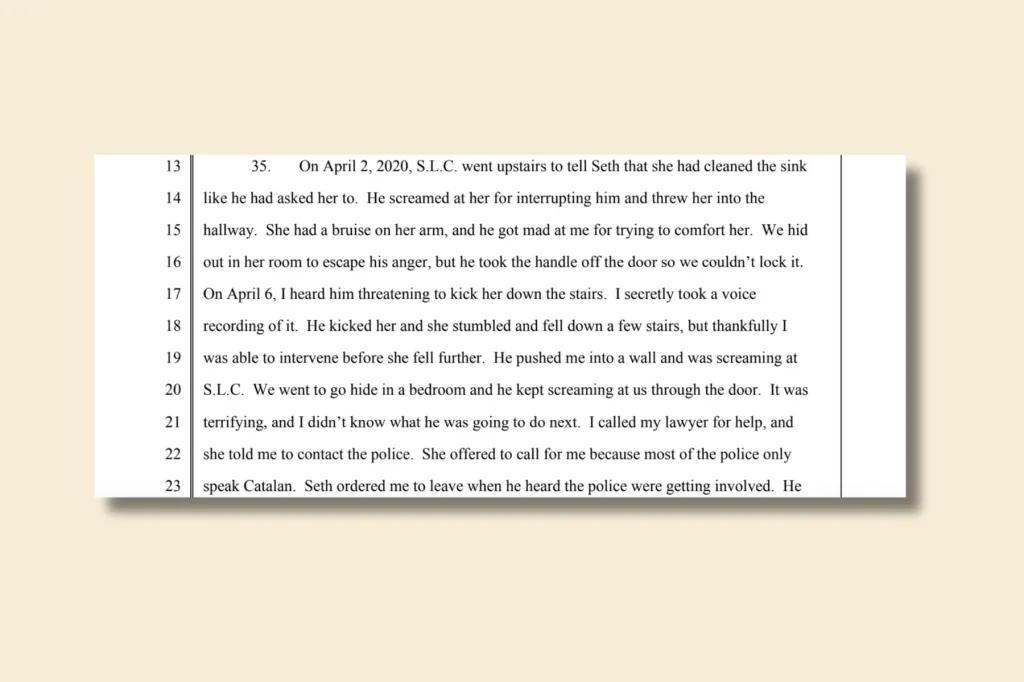 In a sworn declaration she filed in a U.S. federal court in December 2020, Jewel said Seth’s abuse had once again caused her to flee Spain with Lucia. (The 19th/TYPE)
In a sworn declaration she filed in a U.S. federal court in December 2020, Jewel said Seth’s abuse had once again caused her to flee Spain with Lucia. (The 19th/TYPE)After landing in Seattle on April 9, 2020, she texted Seth that she would return the child “when we are legally allowed to travel again and the situation is safe.” She filed an application for a restraining order against him in Snohomish County and a criminal abuse complaint with Spanish police.
Seth reported her to Spanish police for parental child abduction, a felony that carries a prison sentence of up to four years, and filed another Hague petition in Snohomish County. In July, at his request, a judge told Jewel to surrender Lucia to him while the Hague case was pending. Defying this order, she took Lucia by ferry to a small town across the Puget Sound, where they hid out with friends while she prayed for a miracle.
Which, in late summer, seemed to arrive.
Jewel stumbled across the website for Sanctuary for Families and talked to Fidler, who tries to match Hague mothers with pro bono lawyers at big firms. The next thing Jewel knew, she was on a video call with a dozen employees of Orrick, Herrington & Sutcliffe, one of the most prestigious firms in the country.
They didn’t know if she could beat the Hague petition. But they promised to put up a good fight.


